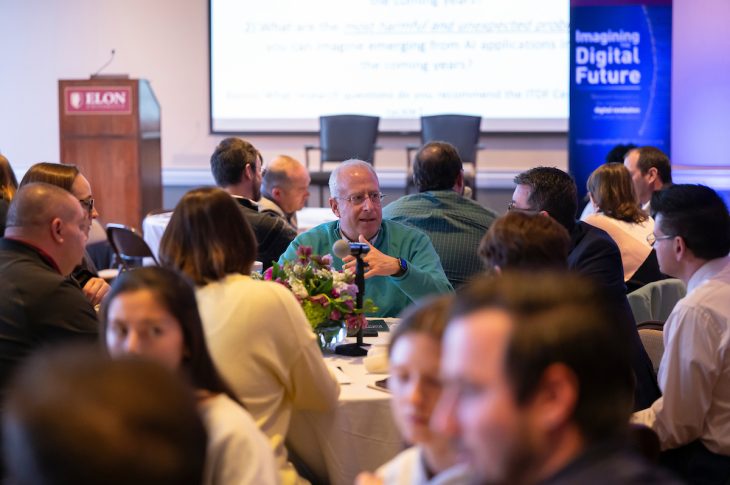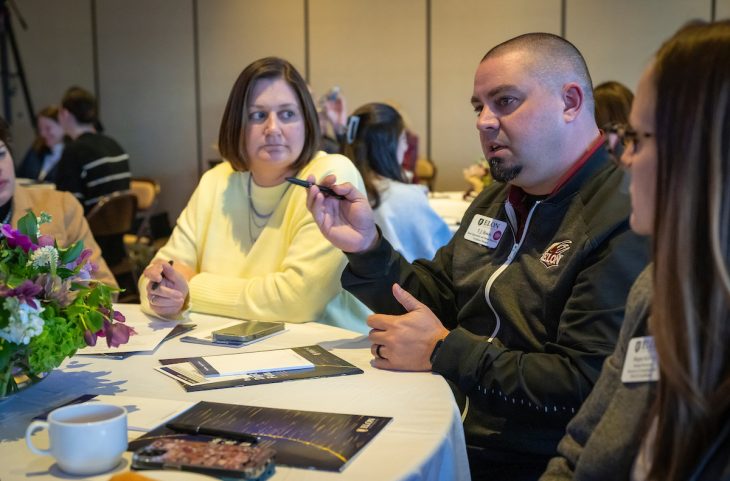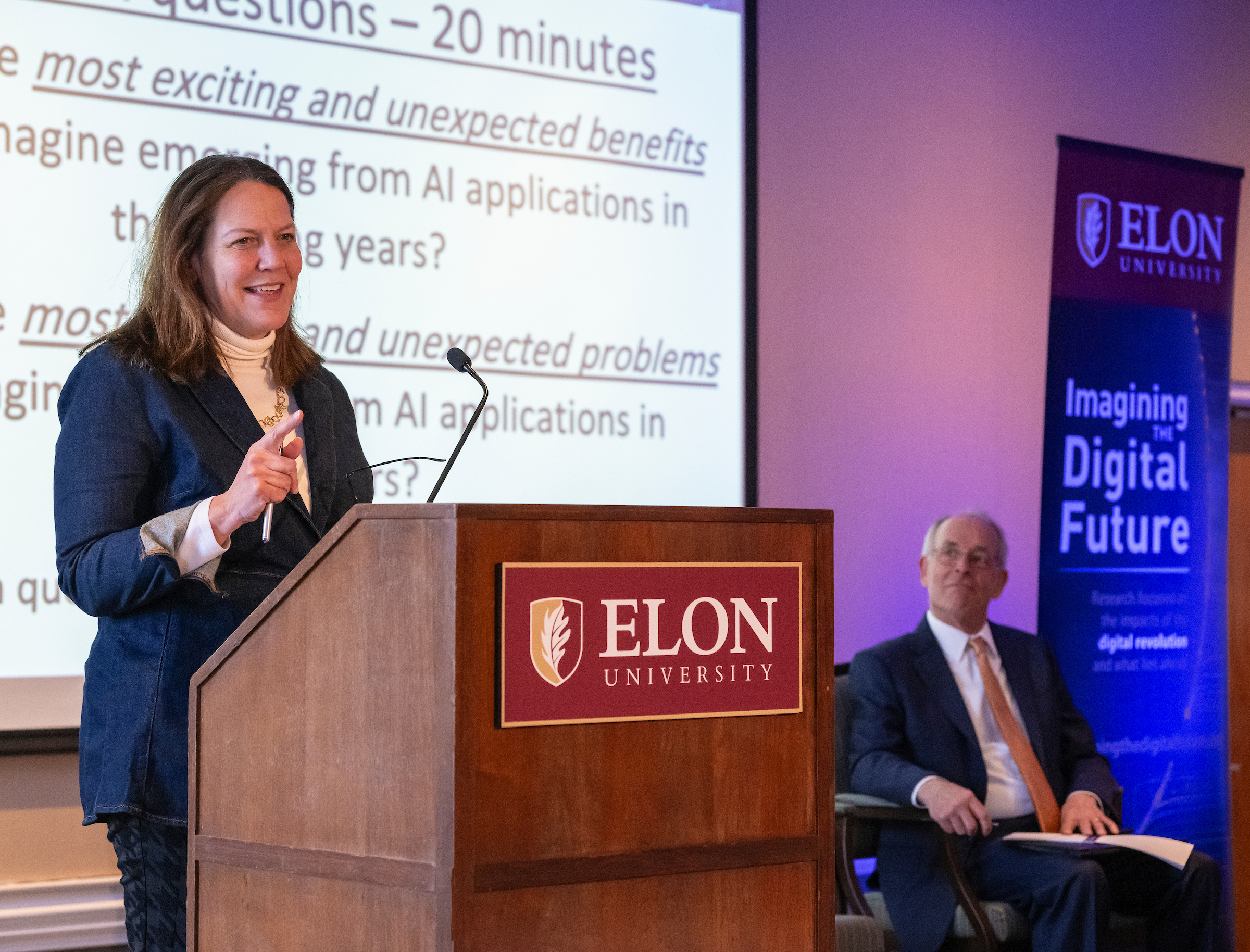Members of the campus community gathered in McKinnon Hall Thursday for a special workshop event to mark the launch of the Imagining the Digital Future Center.
During the past 15 months, the capabilities and capacity of artificial intelligence tools like ChatGPT, Gemini and others have expanded exponentially. So what will happen during the next 15 years with AI?
That was the question posed to dozens of Elon students, faculty and staff on Thursday afternoon for a special launch event for the university’s Imagining the Digital Future Center. The center will expand upon the work during the past 20 years of The Imagining the Internet Center with scholar-in-residence Lee Rainie, with the Pew Research Center, now at Elon as the new center’s director.

The launch event in McKinnon Hall coincided with the release of the center’s new report that explored opinions of the general public as well as scores of experts about where AI would be by 2040. This report, “The Impact of Artificial Intelligence by 2040,” finds both the general public and experts believe enormous upheavals are on the horizon as AI spreads. Many experts go so far as to say that we will have to reimagine what it means to be human and that societies must restructure, reinvent or replace existing institutions and systems. At the same time, they embrace the idea that important benefits will also result from the spread of AI.
President Connie Ledoux Book shared with those gathered that the Imagining the Digital Future Center will be continuing the work of the Imagining the Internet Center that has played an important role in documenting prevailing opinions about where emerging technologies would likely be heading in the future since it launched in 2000. “The rate of digital change today has raised significantly more challenges and opportunities than humanity has ever had to face,” Book said. “Elon University’s Imagining the Internet initiative was launched to document people’s hopes and fears for the future of digital life. The goal has been to inform the public at this time of accelerating change.”
Since it was founded, that center led by Elon Professor Janna Anderson in partnership with Rainie in his former role with the Pew Research Center has produced nearly 50 reports each of which has collected insights from hundreds of experts on topics including the impact of technology on privacy, the line between professional and personal lives, how technological advances could impact democracy and other areas of society and life. That initiative has been renamed as Rainie has moved into the role of director, with Rainie and Anderson again partnering on the new center’s first report that along with collecting input from experts conducted a national survey of the public on how they think a range of ways AI could impact their lives by 2040.
“AI is spurring global debate about where our digital tools and systems are taking us,” Book said. “Today we are seeing the first wave of AI digital assistants that are built to help us take better shortcuts to ‘thinking’ and ‘reasoning’ and ‘understanding.’ … Consider the change that connected people have been experiencing the past 20 years and then imagine what AI might do over the next 15.”

Those attending the launch event answered the same questions posed in the national public opinion survey, with Rainie offering an overview of how the thoughts of those in the room lined up with the results of those who responded to the opinion poll. Rainie noted areas where there was agreement, such as the potentially negative impact upon wealth inequality from the expansion of AI, and where there was disagreement, such as those at the event being much more positive about how AI would impact higher education.
On privacy, there was widespread agreement that AI could have a negative impact. “As these tools become more prevalent, it’s going to be easier to figure out who we are and what we like and how we can be moved in a certain direction,” Rainie said.
Rainie tasked those at each table in the room to discuss some of the most exciting things they can imagine emerging from AI by 2040, as well as some of the most harmful things that might come about.

Assistant Professor of Michelle Lashley reported from the discussion at her table, which predominantly included students, that they saw the most potential in the area of health care, with the potential to streamline care and help promote better communications between provider and patient, particularly when there are language barriers. They are already tapping into its potential, she said. “They are really enjoying using it as a brainstorming partner,” Lashley said. “It helps them explore avenues they might not otherwise have thought about.”
Other ideas percolated up from the tables, such as the use of AI as a tool to assist those who had experienced some trauma — they would be able to talk to the AI assistant without fear of traumatizing the assistant with what they were sharing. Others saw potential harm in the ability of AI to become a propaganda tool that could spread dogmatic thinking or as a replacement for personal interaction that could promote isolation.

Assistant Provost and Professor Amy Overman shared details about her table’s discussion, noting that the ability of AI to fill entry-level jobs could have broader impacts. “We wondered how people will get the experience at the entry level that will be necessary to scaffold into other jobs,” Overman said.
Book shared that it will be important for the university to take seriously both the opportunities and the areas for caution as artificial intelligence continues to evolve and that the work by the Imagining the Digital Future Center will be important to both document and inform the changes to come. “There is no shortage of research topics and it’s going to affect every person, every life, every discipline, all of our futures,” Book said. “I’m thrilled for us to have the capacity and the desire to lead in this important work.”



